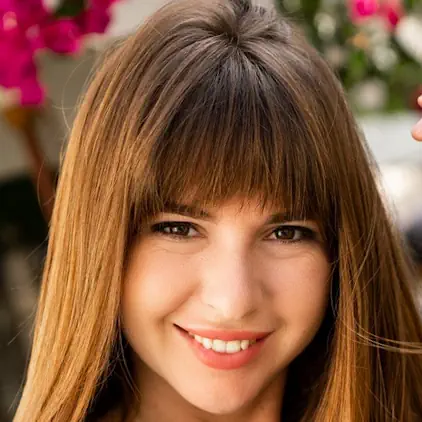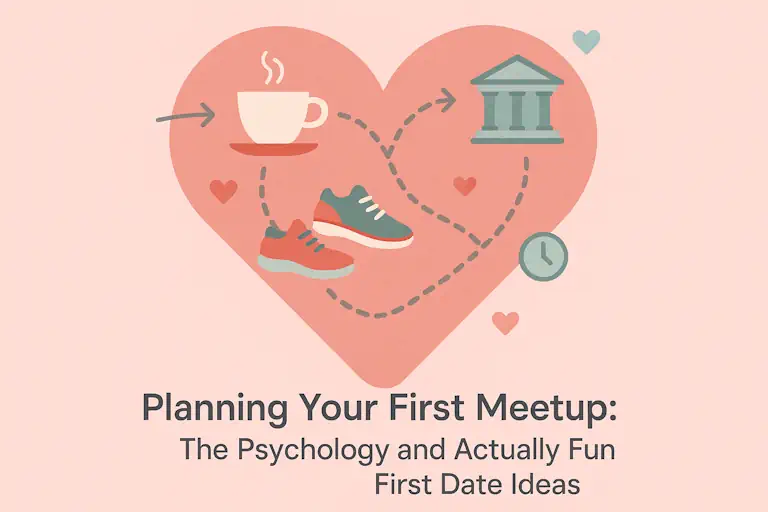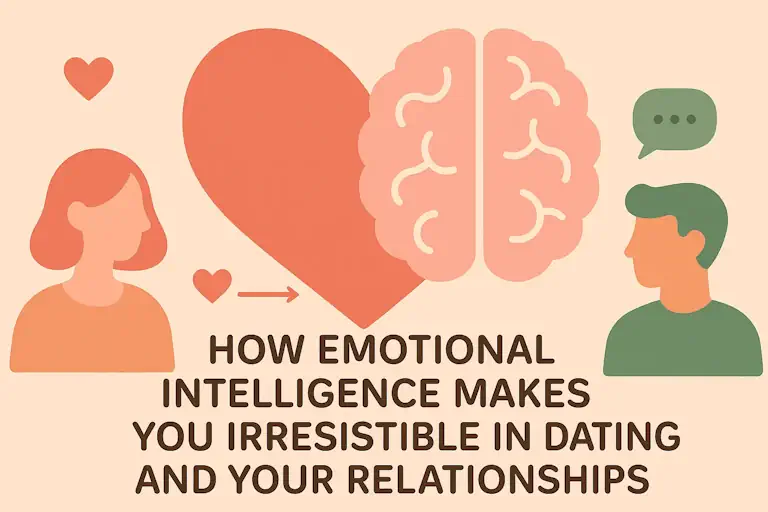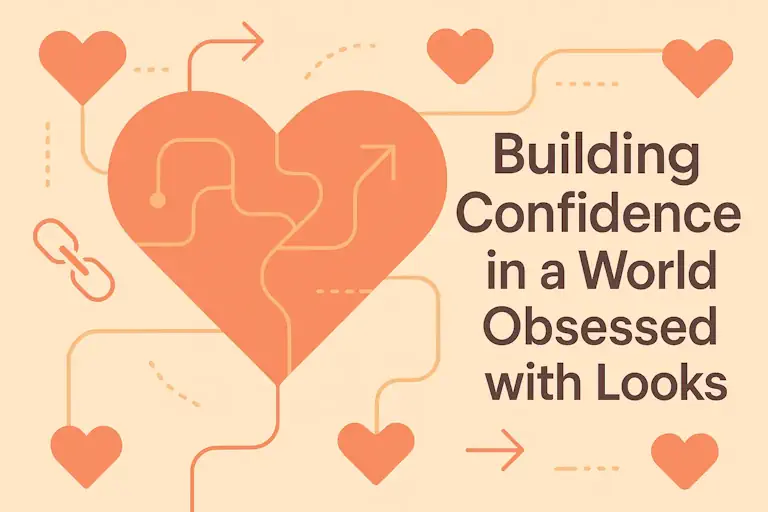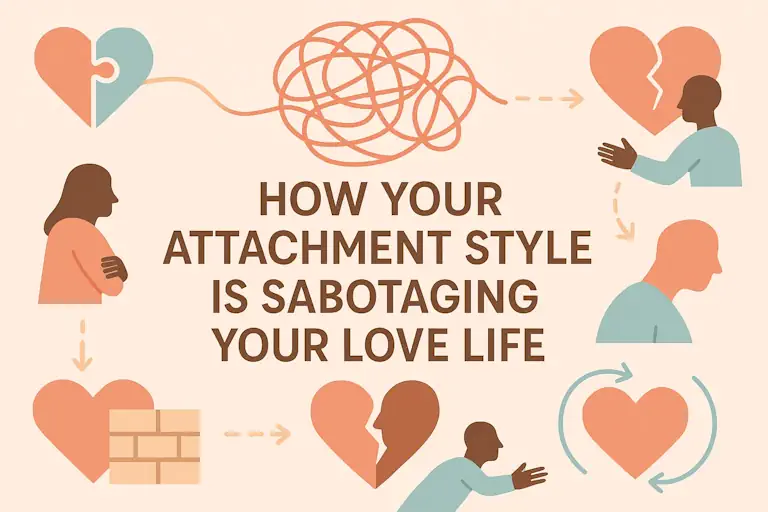You matched. You chatted. You vibed. And now it's time for the first in-person meetup. Cue the sudden anxiety spiral: Where do you go? What if it's awkward? How do you keep it low-pressure, not too pricey, but still feel like you're not just... winging it?
The truth is, a first date shouldn't feel like an audition or a finance-draining ordeal. And yet, so many of us default to the same tired ideas - dinner, drinks, the movies - without stopping to ask: is this actually the best way to get to know someone?
Let's fix that.
In This Article
- Why Your First Date Plan Matters More Than You Think
- What to Avoid (Seriously, Stop Suggesting These)
- What Actually Works: Low-Stakes, High-Vibe Ideas
- Tailoring It to Her (and Why That Matters)
- The Psychology of First Impressions
- Solving the Real Problem: Awkwardness, Safety & Connection
- Final Thoughts (and a Little Tough Love)
Why Your First Date Plan Matters More Than You Think
Here's the thing about first dates that we often forget: they're not about impressing someone, they're about figuring out if you actually want to spend more time with them. And that works both ways.
Did You Know?
Women are more likely to agree to a first date if the location is public, affordable, and allows an easy exit option, according to a 2022 Bumble study. Safety and comfort aren't negotiable - they're foundational.
So, the first meetup should be about one thing: creating space for conversation and connection. That means safety, comfort, and a setting where you can actually talk. Sounds basic, but you'd be surprised how often people get this wrong.
What to Avoid (Seriously, Stop Suggesting These)
Some ideas need to be retired. Not because they're inherently bad, but because they don't serve the purpose of a first date.
First Date Ideas to Avoid:
- The Cinema: You're both sitting silently in the dark for two hours. How is that a date? Save this for date #4, once you've already talked each other to death.
- Hiking: As romantic as a mountain view sounds, asking a woman to walk into the wilderness with a stranger? Hard pass. It's not about you being a nice guy - it's about her not having to take that risk.
- (Expensive) Dinners: First date, not a job interview. Shelling out $100+ just creates pressure and weird expectations.
- Anything Remote or Hard to Leave: If she can't Uber home easily, you're doing it wrong.
The goal is to create a relaxed environment where you can get to know each other without pressure or safety concerns. Women, especially, are constantly assessing risk when meeting someone new - and rightfully so. Making her feel safe and comfortable should be your top priority.
Remember, a first date is just an introduction. It's not about trying to force a magical connection or create an epic experience - it's about seeing if basic chemistry and compatibility exist[1].
What Actually Works: Low-Stakes, High-Vibe Ideas
Here's the golden rule: anything that allows you both to talk freely, leave easily, and costs under $30 is a win. Bonus points if it's a little quirky or unexpected.
Best First Date Ideas:
- The Walk & Talk: Classic for a reason. Find a park, a quiet neighborhood, or a waterfront promenade.
- Casual Coffee or Tea: Low-key vibe, leave after 30 minutes - or stay for two hours if it's going great.
- Farmer's Market or Street Fair: Tons to talk about, low cost, and easy to keep moving.
- Cook Something Together: For when you've talked longer and built trust first.
- Easy-Entry Museums or Exhibits: Local art shows or science museums provide conversation starters.
- Mini Sports: Mini golf, table tennis, or axe-throwing in public spaces can be great icebreakers.
"The best dates feel like play, not performance." - Esther Perel, psychotherapist and relationship expert[1]
Walking side by side takes the pressure off constant eye contact (which can feel intense on a first meeting) and naturally creates a more relaxed conversation flow. Research shows that moving through space together - whether walking, browsing a market, or exploring a museum - creates a shared experience that bonds people more effectively than sitting face-to-face in an interview-like setting[2].
Consider activities that give you both something to focus on or talk about. This takes the pressure off having to constantly generate conversation topics and lets interaction flow more naturally. The goal is to create a situation where you can get glimpses of each other's personalities without the pressure of a formal "date."
Tailoring It to Her (and Why That Matters)
The smartest move? Actually pay attention to what she's into. If her profile mentions a love for old books, maybe suggest a quirky secondhand bookstore. Into photography? Go on a photo walk. Into coffee? Ask about her favorite café and meet there.
Women don't want you to just ask what they want - they want you to take initiative based on what they've already shared. Don't be afraid to say, "Hey, I saw you love art - there's a small exhibit downtown this weekend, want to check it out?"
That's attractive. That's thoughtful. That's how you stand out.
This approach demonstrates that you've been paying attention and that you respect her interests. It shows emotional intelligence - the ability to tune into another person's world and respond thoughtfully. According to relationship experts, this quality ranks among the top traits women look for in potential partners[2].
The Psychology of First Impressions
Your date starts forming an impression of you in the first few minutes, based on subtle cues: your energy, your confidence, your curiosity. According to research on thin-slicing by psychologist Nalini Ambady, people form surprisingly accurate impressions of others in seconds[2].
First Impressions: What Matters Most
- Authenticity trumps perfection - trying too hard is obvious
- Active listening creates stronger connection than impressive talking
- Body language accounts for over 50% of first impression formation
- Shared laughter creates instant bonding and comfort
So what does that mean for you? Be present. Be relaxed. Don't oversell yourself - but don't disappear into a puddle of nervousness either.
Here's a trick: focus on curiosity over performance. If you're genuinely interested in getting to know her, it'll show - and it'll make her more comfortable too.
This principle aligns with what psychologists call the "reciprocity of liking" - when people feel you're genuinely interested in them, they tend to become more interested in you. It's not about tricks or techniques but about creating authentic connection through genuine curiosity.
Solving the Real Problem: Awkwardness, Safety & Connection
The real reason you're reading this? You want the date to go well without being a disaster. You want to avoid that weird limbo where the conversation stalls and you both start mentally reaching for the exit.
First Date Success Formula:
- Choose a place that makes conversation easy
- Make sure it's safe and public
- Have a light plan, with a natural out
- Take the lead, but stay adaptable if she wants to pivot
A well-thought-out, simple first date shows you care. It shows you're respectful, intentional, and emotionally intelligent - all green flags, no ick.
And here's something crucial: plan an activity with a natural time boundary. Coffee can be a quick 30-minute meetup if there's no chemistry, or it can extend into a walk if there is. This gives both parties an easy out without awkwardness, reducing pressure and expectations.
Remember, first dates are about discovering compatibility without pressure. The most successful first meetups are those where both people feel comfortable enough to be themselves.
Final Thoughts (and a Little Tough Love)
If you're still thinking "but what if she doesn't like what I pick?" - you're missing the point. The point is to create space for connection, not perfection. Show effort, not extravagance.
And remember, this isn't just about impressing someone. It's about finding out if you two click at all. Keep it simple. Stay safe. Lead with thoughtfulness. And if it doesn't go perfectly? That's okay. It's just a first date, not the finale of The Bachelor.
"Dating isn't about finding someone who checks all the boxes. It's about finding the person whose quirks and flaws complement your own."
What matters most is creating an environment where you can both be yourselves. Because the right match isn't about impressing someone with elaborate plans - it's about finding someone who appreciates your authentic self.
Want more first-date tips, real-world psychology, and ideas that actually work? Join our newsletter for more unfiltered dating advice that doesn't suck.
Reader Stories
"After several awkward dinner dates with other people, I finally took this advice and suggested a small photography exhibition for a first date. It was perfect - we had built-in conversation topics, could move at our own pace, and the pressure was completely off. We ended up walking to a coffee shop afterward and talking for hours. We're engaged now, and still love museum dates as our go-to!"
"As a woman, I always felt anxious about first dates and would often cancel last minute. When I started being clear about my boundaries - meeting in public places with easy exit options - my whole experience changed. Not only did I feel safer, but the right guys were completely understanding and even appreciated my directness. The wrong guys weeded themselves out immediately. Now I actually look forward to meeting new people."
Frequently Asked Questions: First Date Planning
What's the best way to suggest a first date location?
The best approach is to suggest 2-3 specific options rather than an open-ended "Where do you want to go?" This shows initiative while still giving your date input. Your suggestions should be based on what you know about their interests, keeping safety and comfort in mind. For example: "I'd love to meet up this weekend. There's a great coffee shop downtown called [Name], or if you prefer, there's a farmers market at [Location] on Saturday morning. Would either of those work for you?" If they counter with their own suggestion, be flexible and open to their ideas.
How long should a first date last?
The ideal first date should have a natural ending point at about 60-90 minutes, with the flexibility to extend if both people are enjoying themselves. Planning an activity with a built-in time limit (like coffee or a single drink) creates an easy exit if there's no chemistry while allowing for an organic extension if things are going well. You can always say, "This has been fun. Would you like to continue the conversation with a walk in the park nearby?" This approach keeps the date pressure-free and gives both people agency over the duration.
Who should pay on a first date?
This topic causes unnecessary stress for many people. A good rule of thumb: whoever initiated the date should be prepared to pay, but be open to splitting if your date offers. For low-cost first meetups (coffee, ice cream, etc.), it's often simplest for one person to cover the modest bill. If you're uncertain about expectations, you can reduce awkwardness by suggesting meetups where you each pay for yourselves at the counter. What matters most isn't who pays, but that neither person feels uncomfortable about the financial arrangement. Open communication with phrases like "I'd like to get this one, maybe you can get the next one if we meet again?" can ease tension.
How do I keep the conversation flowing on a first date?
Great conversation happens when you balance genuine curiosity with appropriate self-disclosure. Prepare a few open-ended questions about their interests, experiences, or opinions (not just yes/no questions). Follow the "thread" of their answers rather than jumping to the next question on your mental list. Share relevant stories about yourself that relate to what they're saying, but avoid dominating the conversation. Remember that activities that give you something external to focus on or comment on (like walking through a market or visiting a small exhibition) naturally create conversation starters and fill potential awkward silences. Most importantly, listen actively rather than just waiting for your turn to speak.
References
- Perel, E. (2017). The State of Affairs: Rethinking Infidelity. Harper.
- Ambady, N., & Rosenthal, R. (1992). Thin slices of expressive behavior as predictors of interpersonal consequences: A meta-analysis. Psychological Bulletin, 111(2), 256–274.
 The Modern Dater
The Modern Dater
